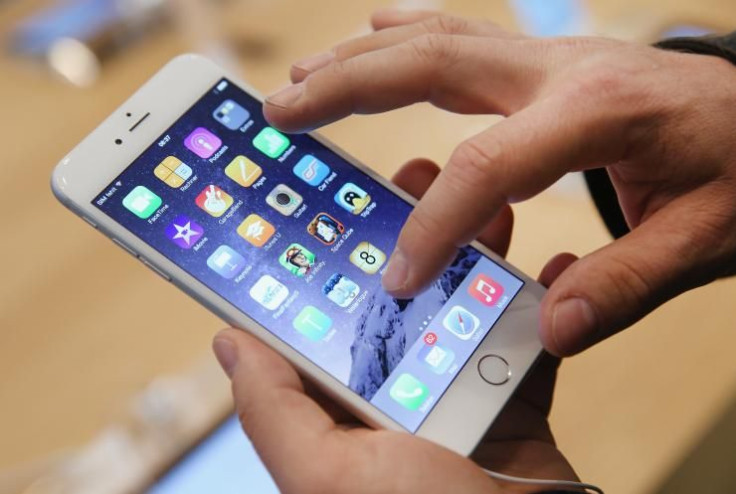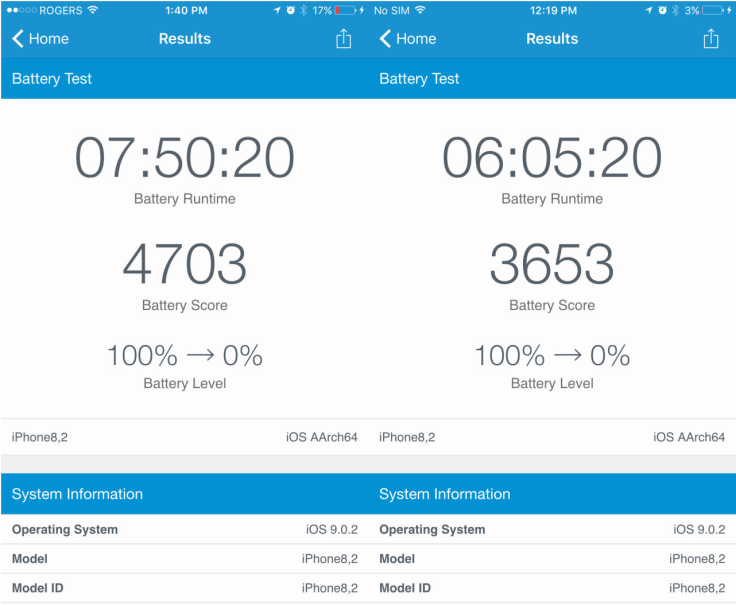iPhone 6S Chipgate: Battery Life On Apple Inc. Smartphone Depends On Whether You Get Samsung Or TSMC A9 Chip

Update: 5:50 p.m. EDT - Apple has responded to the issue over the difference in battery life from the two phones, suggesting the difference is at most 3%:
"With the Apple-designed A9 chip in your iPhone 6s or iPhone 6s Plus, you are getting the most advanced smartphone chip in the world. Every chip we ship meets Apple's highest standards for providing incredible performance and deliver great battery life, regardless of iPhone 6s capacity, color, or model. Certain manufactured lab tests which run the processors with a continuous heavy workload until the battery depletes are not representative of real-world usage, since they spend an unrealistic amount of time at the highest CPU performance state. It's a misleading way to measure real-world battery life. Our testing and customer data show the actual battery life of the iPhone 6s and iPhone 6s Plus, even taking into account variable component differences, vary within just 2-3% of each other."
Original Story:
LONDON -- Your iPhone 6S could have up to 20 percent less battery power than another iPhone 6S depending on the manufacturer of the chip powering your new Apple smartphone.
With the iPhone 6 we had Bendgate. For the iPhone 6S and iPhone 6S Plus, it appears the controvery could be called Chipgate as users report that the battery life of the iPhone 6S is entirely dependant on which vendor has made the A9 chip inside.
Multiple reports and videos posted online claim that depending on which version of the A9 chip you get, your smartphone's battery life may be affected by as much as 20 percent. While Apple has yet to confirm it, the A9 chip is supplied by two different manufacturers -- Samsung and Taiwan Semiconductor Manufacturing Company (TSMC) -- a fact uncovered by Chipworks last month. You can find out which chip your iPhone 6S has here.
While both versions will be using the same microarchitecture designed by Apple, they use different processes, which could lead to the issues which users are now reporting. This is the first time Apple has ever used two manufacturers to produce the A-series of chips which power the iPad and iPhone ranges. Samsung produced every chip up to and including the A7, while TSMC produced the A8 chip last year.
Chipworks discovered that the Samsung chip was 8 percent smaller and an investigation by Anandtech showed it was built on a 14nm process, while the TSMC chip was built on a thicker 16nm process. There is no official word from Apple on what percentage of its iPhone 6S and iPhone 6S smartphones are powered by each chip, but user reports suggest the split is close to 50/50.
Battery Tests
Threads on forums such as Reddit and MacRumours are filled with users showing battery tests for both chips and the consensus appears to be that the battery life on the iPhone 6S with a Samsung-made chip is worse. As well as these user reports, a couple of well-known YouTubers have published videos comparing the performance of the chips.
According to Jonathan Morrison, who carried out a range of tests including shooting 4K video and exporting the content to iMovie, the TSMC-powered iPhone 6S was at 62 percent battery while the Samsung-powered iPhone 6S was at 55 percent battery.
In another video, Austin Evans ran a number of tests on the two versions of the iPhone 6S. In the first comparison, which used the Geekbench 3 battery test, the difference was marked, with the TSMC version lasting a full 50 minutes longer to drop from full battery to 50 percent.
This test would match up with the results posted on Reddit by an iPhone 6S Plus owner who claims to have both versions in his possession. The results show a 1 hour 45 minutes difference in battery life on the two devices after running the Geekbench 3 test.

However, as Evans himself says, Geekbench is the worst case scenario for battery life and doesn't really reflect real world uses. In a second test, he played the same one-hour YouTube clip and found that the difference in battery drain was just 1 percent, with the TSMC again coming out on top.
In terms of performance, both chips appear to offer very similar results, though in Evans' testing he found the Samsung chip ran up to 3 degrees warmer than the TSMC chip. Because the TSMC chip is built on a bigger 16nm process, it was expected to offer worse battery life than the 14nm Samsung chip
International Business Times has contacted Apple to comment on the issue, but at the time of publication there has been no response.
Dual sourcing
There is no way of telling which version of the A9 your iPhone 6S will have ahead of time with no noticable pattern for their dispersal at the moment, though some Reddit users have reported returning Samsung-powered iPhone 6S models within 14 days to try and get a TSMC-powered model.
Dual sourcing components is rare, and for such a high-profile product like a new iPhone, is almost unheard of. The reason why Apple decided to go down the expensive and risky route of contracting two companies to make the A9 chip is unknown, but could be down to issues of yield at one company or the other, or it wanted to make sure it could meet much higher demand.
Apple has some history when it comes to problems with dual sourcing. Back in 2012, both Samsung and LG supplied displays for the company's MacBook Pro laptop. However it was discovered after the laptops went on sale that the screens supplied by LG caused temproary burn-in and ghosting, leading to a class action lawsuit in California against the company.
Earlier this year, AAC Technologies Holdings was blamed for delays in shipping the Apple Watch as a result of Taptic Engine components it was supplying. Apple subsequently moved all manufacturing to its other supplier, Nidec.
© Copyright IBTimes 2024. All rights reserved.












